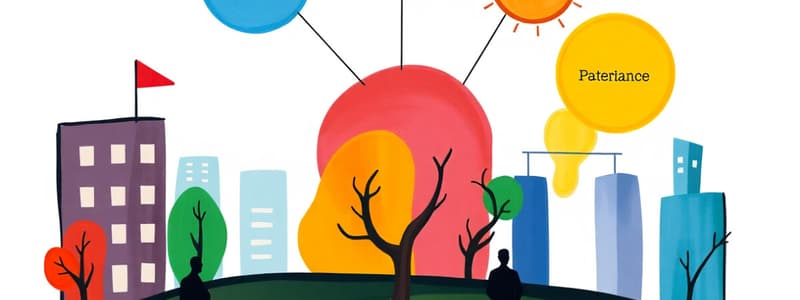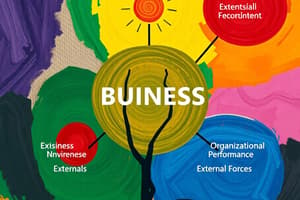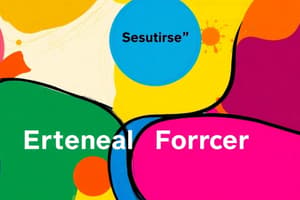Podcast
Questions and Answers
Which factor is NOT considered part of the general environment?
Which factor is NOT considered part of the general environment?
- Technological factors
- Political and legal factors
- Economic factors
- Customer preferences (correct)
What primarily characterizes environmental uncertainty?
What primarily characterizes environmental uncertainty?
- The level of knowledge about environmental components
- The stability of political institutions
- The unpredictability of competitor actions
- The frequency of organizational change (correct)
Which of the following components relates directly to socio-cultural factors?
Which of the following components relates directly to socio-cultural factors?
- Economic growth rates
- Technological advancements
- Government regulations
- Customs and values of a society (correct)
Which of the following is a major force within the technological environment?
Which of the following is a major force within the technological environment?
In an international PESTEL analysis, which category deals with trade agreements?
In an international PESTEL analysis, which category deals with trade agreements?
What aspect of the demographic environment does NOT affect organizations?
What aspect of the demographic environment does NOT affect organizations?
Which of the following factors is NOT included in the competitive environment?
Which of the following factors is NOT included in the competitive environment?
Which force would most directly impact environmental sustainability practices?
Which force would most directly impact environmental sustainability practices?
Which of the following scenarios represents complexity in the business environment?
Which of the following scenarios represents complexity in the business environment?
What are the main components that comprise a competitive environment?
What are the main components that comprise a competitive environment?
Which factor increases the intensity of rivalry among competitors in an industry?
Which factor increases the intensity of rivalry among competitors in an industry?
What is a key characteristic of a strong organizational culture?
What is a key characteristic of a strong organizational culture?
How do external stakeholders primarily benefit from a company?
How do external stakeholders primarily benefit from a company?
Which of the following dimensions of organizational culture emphasizes the degree of precision and analysis in work?
Which of the following dimensions of organizational culture emphasizes the degree of precision and analysis in work?
What establishes the foundational culture of an organization?
What establishes the foundational culture of an organization?
What is one of the consequences of high bargaining power of buyers?
What is one of the consequences of high bargaining power of buyers?
In Porter’s model, which force is affected by the presence of substitute products?
In Porter’s model, which force is affected by the presence of substitute products?
Which is NOT a characteristic of suppliers with high bargaining power?
Which is NOT a characteristic of suppliers with high bargaining power?
Which of the following accurately describes the role of internal stakeholders?
Which of the following accurately describes the role of internal stakeholders?
Flashcards
Business Environment
Business Environment
The factors outside a company that can affect its performance.
Environmental Uncertainty
Environmental Uncertainty
The degree to which an organization's environment is constantly changing and how complex it is.
General Environment
General Environment
The broad set of factors that affect all organizations in general, such as economic, political, and technological changes.
Competitive Environment
Competitive Environment
Signup and view all the flashcards
Economic Factors
Economic Factors
Signup and view all the flashcards
Technological Factors
Technological Factors
Signup and view all the flashcards
Political and Legal Factors
Political and Legal Factors
Signup and view all the flashcards
Socio-cultural Factors
Socio-cultural Factors
Signup and view all the flashcards
PESTEL Analysis
PESTEL Analysis
Signup and view all the flashcards
International Factors
International Factors
Signup and view all the flashcards
Porter's Five Forces Model
Porter's Five Forces Model
Signup and view all the flashcards
Rivalry Among Competitors
Rivalry Among Competitors
Signup and view all the flashcards
Threat of New Entrants
Threat of New Entrants
Signup and view all the flashcards
Bargaining Power of Suppliers
Bargaining Power of Suppliers
Signup and view all the flashcards
Bargaining Power of Buyers
Bargaining Power of Buyers
Signup and view all the flashcards
Threat of Substitutes
Threat of Substitutes
Signup and view all the flashcards
Organizational Culture
Organizational Culture
Signup and view all the flashcards
Strong Organizational Culture
Strong Organizational Culture
Signup and view all the flashcards
Weak Organizational Culture
Weak Organizational Culture
Signup and view all the flashcards
Study Notes
Business Environment
- Environment encompasses external forces impacting organizational performance.
- Environmental uncertainty varies based on change and complexity.
- Change: frequency of components' alterations.
- Complexity: number and known components.
General Environment
- General environment affects all organizations, encompassing:
- Political, economic, socio-cultural, technological, environmental, and legal factors.
- Major forces in the general environment:
- Economic: interest rates, inflation, unemployment, economic growth.
- Technological: infrastructure advancements, industrial innovations.
- Political and legal: political stability, government regulations, laws/regulations.
- Socio-cultural: customs, values, lifestyles, beliefs, behavioral patterns.
- Demographic: population characteristics (age, gender, ethnicity, etc.).
- Environmental: production pollution, sustainable energy, and climate change.
- International: an organization's involvement in global business.
International PESTEL Analysis
- Specific PESTEL analysis for international business:
- Political: foreign investment attitudes, political stability, IP policy.
- Economic: growth rates, wealth distribution, currency stability, exchange rates.
- Socio-cultural: national cultures, attitudes toward foreign companies.
- Technological: telecoms, power stability, import/export infrastructure.
- Environmental: natural resources, environmental effects.
- Legal: tariffs, trade agreements, employment laws, taxation.
Competitive Environment
- Competitive environment encompasses forces from
- suppliers,
- distributors,
- customers, and
- competitors.
- Forces affect obtaining inputs and disposing of outputs.
Porter's Five Forces Model
- Analyzes industry attractiveness.
- Rivalry among competitors:
- Number of competitors,
- demand growth,
- product differentiation,
- exit barriers affect intensity.
- Threat of new entrants: High entry barriers (capital, economies of scale, licenses) reduce threats.
- Bargaining power of suppliers: Dependent on supplier numbers, customer purchasing patterns, supplier growth, switching costs.
- **Bargaining power of buyers:**High buyer power reduces industry profit potential.
- Threat of substitutes: Similar products/services in different industries.
Organizational Culture
- Organizational culture shapes behavior and distinguishes organizations.
- Strong culture: Shared values, employees identify, historical stories.
- Weak culture: Limited top management values, inconsistent messages.
Organizational Culture: Levels
- Visible artifacts: observably (dress, behavior, ceremonies).
- Invisible:
- Values and beliefs, derived from stories, language.
- Underlying assumptions, guiding behaviors and decisions (role-modelling, legends, nicknames).
Organizational Culture: Dimensions
- Adaptability,
- Attention to detail,
- Outcome orientation,
- People orientation,
- Team orientation,
- Integrity.
Organizational Culture: Establishment
- Founded on founder's vision, reflected in employee selection & socialization practices and manager's actions.
Stakeholders
- Stakeholders are individuals or groups with interest in the company.
- Internal stakeholders (employees, managers, stockholders)
- External stakeholders (customers, creditors, governments)
Stakeholders' Claims
- Stockholders: maximize return on investment.
- Managers: balance stakeholder needs, resource usage.
- Employees: rewards from performance.
- Suppliers: fair, prompt payment.
- Distributors: quality products and agreed prices.
- Customers: company survival depends on attracting them.
- Community: physical and social infrastructure.
Studying That Suits You
Use AI to generate personalized quizzes and flashcards to suit your learning preferences.




